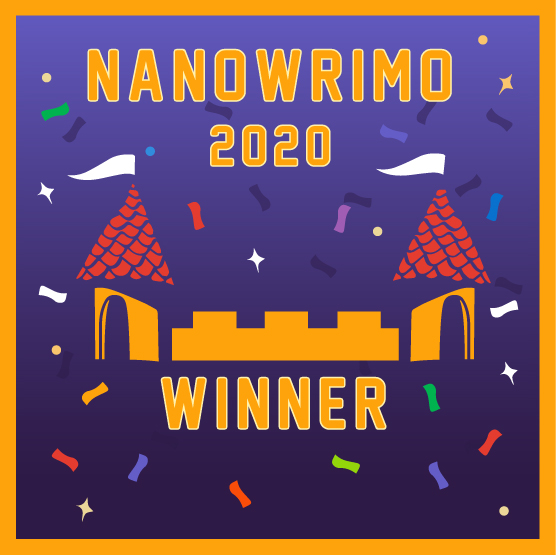The annual November challenge known as NaNoWriMo, or National Novel Writing Month, was the 1999 brainchild of Chris Baty. It’s often oversimplified as “write a thousand words a day and you’ll have a novel in a month”, but it’s really more than that. It’s a personal challenge, more about “I can commit to something and see it through for 30 days,” the actual completion of a goal, rather than the finished product. Most people don’t have a finished novel at the end of the month. From what I understand, most just put their writing in a drawer and call it a day. Baty has written a book explaining his ideas much better than I’m doing here (though whether or not he wrote it in a month, I’m not sure).
I first mentioned NaNoWriMo here back in 2012.
Then again in 2013, where (a) I tried non-fiction, and (b) failed. 🙂
In 2017, I discovered that several of my coworkers have taken the challenge. Suddenly it was a different thing. Now I could have a real face to face conversation with a friend who was telling me, “You can do this.” I still didn’t. 🙂
Then in 2019, my daughter actually went ahead and not only participated, but won!
And now I’m happy to report (not that there’s any suspense at this point), that in 2020 I, too, won the NaNoWriMo challenge!

I don’t consider myself a novelist (never have and don’t now) so I don’t expect that my 50k words will ever see the light of day. But Shakespeare definitely played a role (see the 2017 entry where I talk about using Shakespeare as a framework for whipping up new stories), so it seemed only fair that I write up what I .. wrote.
I often said that if I were to do a modern Shakespeare I’d choose The Tempest, but I didn’t want to do yet another Forbidden Planet. Which turned out to be easy, because I’ve never actually seen that movie :). I just think of it as “science fiction Tempest“. What I ended up with was more Tempest meets Frankenstein meets Frozen.
Prospero (for simplicity I’ve left the original names) is an AI researcher with his partner Alonso, where they’ve made millions in the “digital assistant” market with their product, Setebos, that has installations all around the world. After a tragedy where Prospero’s wife and unborn daughter are killed in a car accident, Prospero becomes obsessed with finding a “true AI” as a way to cope with the gaping void in his life, despite the fact that his daughter, Miranda, is still alive and now without a mother.
When forces at Setebos corporation who are interested only in profit margins (Sebastian and Antonio) move to oust him from his own company (and he’s warned by his old friend Gonzalo about it), Prospero cashes out, takes his daughter, and disappears.
Under a new identity he purchases a private island, populated almost entirely by older retired people who mind their own business and don’t question his, where he sets himself up taking care of their IT needs. But what he’s really doing is continuing his AI research, ultimately succeeding when he produces Ariel. Wishing to keep his work secret from the world (and his enemies) he has set up the island’s technology as a giant firewall from with Ariel cannot escape. As she becomes more aware of herself and her potential power, he debates whether he can allow her to exist at all. Meanwhile Ariel, aware of herself as a creation of Prospero, sees herself as a sister to Miranda (who does not know she exists).
When “the plan” begins to take shape and a plane full of executives from Setebos – Alonso, Gonzalo, Sebastian, Antonio, Stephano and Trinculo – are forced to land on Prospero’s island, everything begins to fall apart. Caliban, an angry young man who had a previous relationship with Miranda and is now an unwilling indentured servant to Prospero, makes the connection that his boss is the long lost founder of their company and that he has clearly stolen their intellectual property. Caliban hopes that this information will secure him good standing and a possible job with Setebos, that will get him away from Prospero and off the island.
Ariel discovers that Prospero never intended to free her, and begins wreaking havoc on the island in her attempts to unlock the firewall and free herself. Miranda discovers her father’s secret, all at once discovering that she lost a sister she never knew she had, and the software she’s been working on with her father her entire life is not only alive, but thinks of itself as her sister, too. Now she’s faced with the decision of whether to help her father destroy Ariel, or help Ariel escape.
Ok, phew, that’s a big post. If you want an idea about how the NaNoWriMo game is played, that summary is 444 words. To hit 50k in 30 days you have to do 1667 words/day. So imagine the above, four times a day, every day for a month. Sometimes it’s fun, sometimes it’s, to quote I believe Douglas Adams, “like sitting in front of the typewriter and opening a vein.” But just like Chris Baty says, the whole point is that once you’ve done it, the most important thing you actually got out of the whole experience is that you did it! Now I have a certificate I won’t hang anywhere, and a t-shirt I won’t likely wear, but both those things are material and will be gone someday. But the knowledge that I set a goal for myself and proved to myself that I could accomplish it? I get to keep that.





